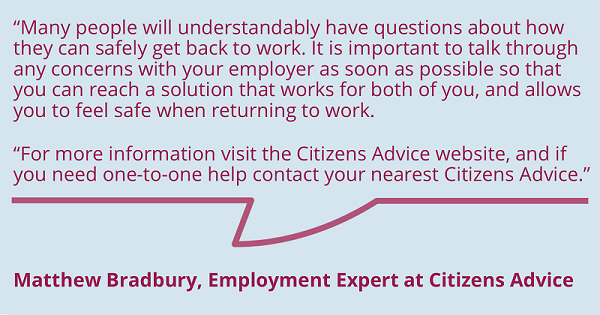 With government guidance now stating that, for some sectors, those who cannot work from home should return to work, Citizens Advice has outlined the top six need-to-knows when it comes to your employment rights.
With government guidance now stating that, for some sectors, those who cannot work from home should return to work, Citizens Advice has outlined the top six need-to-knows when it comes to your employment rights.
The advice below was first published on 19 May 2020. New government guidelines come into effect on 1 August 2020. After this time please visit the Citizens Advice website for the most up-to-date advice if you're worried about working because of coronavirus.
Returning to work: the top six need-to-knows
1. I’ve been on furlough but my employer has told me to come back to work. Do I have to go?
2. What if the workplace is safe, but the only way I can get there is on crowded public transport?
3. I’ve been called back to work, but my children’s’ school isn’t reopening. What are my rights?
4. I’m in the shielded group, do I have to go back to work if my employer asks?
5. I’m pregnant and worried about returning to work, what can I do?
I’ve been on furlough but my employer has told me to come back to work. Do I have to go?
Under any contract of employment, you have to comply with reasonable management requests. But returning to work might not be ‘reasonable’ if you’re being asked to return to work in an environment where your health and safety is at risk.
The government has published sector-specific guidance about what employers should do to minimise the chances of catching coronavirus at work. If your employer isn’t complying with this guidance or is putting your health and safety at risk in any other way, you need to talk to them about this.
Ultimately, if your concerns aren’t resolved, you could report your employer to the Health and Safety Executive, but ideally you and your employer can solve the issues together.
What if the workplace is safe, but the only way I can get there is on crowded public transport?
Your employer has a legal duty under the law, and under your contract, to ensure that your workplace does not pose a risk to your health and safety.
Your employer’s duty is limited to things that are under its control, and so there is no clear legal position about whether it has to take into account the risks you face when travelling to and from work, as part of its health and safety assessment.
During this pandemic, however, a risk assessment should consider how vulnerable people at higher risk of coronavirus, such as those who are pregnant or over 70, will get to work as public health guidance warns that they must stay at home as much as possible and minimise contact with people outside of their household.
Even if you’re not classed as vulnerable, your employer should listen to your concerns if you’re worried about having to use public transport after being called back into work. You could, for example, ask to travel at quieter times of the day.
I’ve been called back to work, but my children’s’ school isn’t reopening. What are my rights?
If you’re struggling to juggle childcare and work you have a number of options.
Firstly, the government has said that if you’re unable to work due to childcare responsibilities, your employer can continue to furlough you using the Job Retention Scheme.
If your employer will not keep you on furlough, you can ask to work more flexibly, such as at different times or for fewer hours.
Alternatively, you could ask for ‘indefinite unpaid leave’ until you are able to work again.
If your employer says no to the options above, it would be worth asking for help from your nearest Citizens Advice as you may have other rights, such as parental leave.
I’m in the shielded group, do I have to go back to work if my employer asks?
If you’re in the ‘extremely clinically vulnerable’ group, also known as the shielded group, Government guidance says you can go back to work from 1 August 2020 if you can’t work from home and your workplace is safe enough.
If you were previously shielding and working from home, your employer shouldn’t force you to return to work.
Employers are allowed to furlough people for any reason arising from the coronavirus pandemic, including to protect employees' health.
If you’re unable to work from home, ideally, your employer will furlough you for as long as public health advice deems it necessary. If not, you may have rights under the Equality Act 2010. This would help protect you from discrimination.
If you’re in the shielded group and have been denied furlough, you can contact your nearest Citizens Advice for help.
I’m pregnant and worried about returning to work, what can I do?
If you’re pregnant, public health advice says you should minimise contact with other people outside of your household.
Employers are allowed to furlough people for any reason arising from the coronavirus pandemic, so this could include protecting pregnant workers.
There are also pre-existing, pre-coronavirus protections for pregnant women where the workplace poses a risk. This could mean being offered suitable alternative work, or suspension on full pay if no alternative risk-free work is available.
My employer has asked me to return to work on part-time hours rather than full time, can they do this?
The Chancellor has said the Job Retention Scheme will allow furloughed workers to return part time from August. You can find further details about how this will work on the Citizens Advice website.
Until then it’s not clear what the rules are if you are asked to go back to work on reduced hours.
You could try to negotiate a satisfactory solution with your employer, such as fewer employees returning to ensure they can have full-time hours, or you could ask to remain on furlough until the details are clearer.
You may also need to ask to remain on furlough in order to follow public health advice, for example, if you’re shielding, or if you need to stay at home to look after children.
How to contact us for advice
-
Adviceline, which you can reach by calling freephone 0800 144 8848. This is open Monday to Friday (excluding bank holidays) from 9am to 5pm.
- Email, you can contact us for advice by email
Published 19 May 2020
